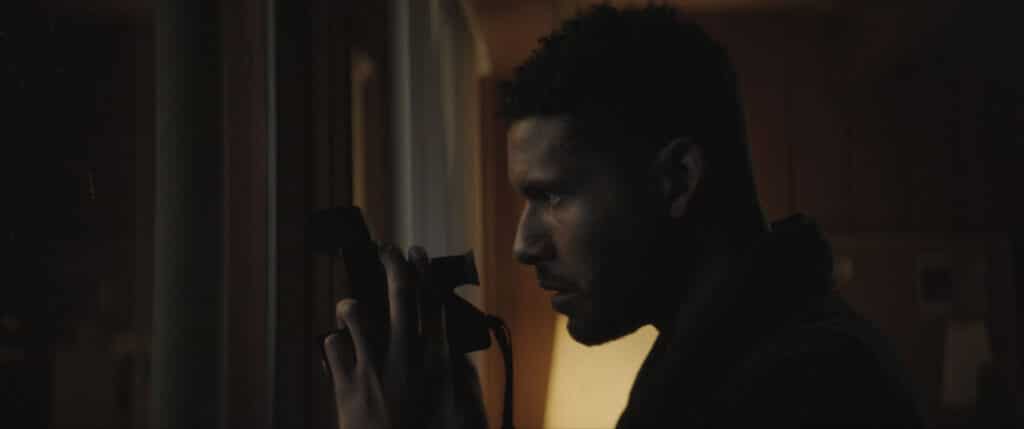Read also:
How to Watch FX Live Without CableHow To Watch AMC Without CableHow to Watch ABC Without CableHow to Watch Paramount Network Without CableKurtis David Harder’s new horror allegory can’t sustain its political or narrative ambitions despite a few spooky moments.
An interracial, gay couple moves to a small suburban enclave with their teenage daughter. At first, the neighbors appear friendly and open-minded towards the new residents. Then Satanic cult rituals start happening, blood drips from the ceilings, and the neighbors quickly become something more hostile.
These are the plot points of a psychological horror film that could take place today, but screenwriters Colin Minihan and John Poliquin set that latest Shudder exclusive, Spiral (not to be confused with the upcoming Saw franchise entry starring Chris Rock), all the way back in the Clinton era of prosperity that was 1995. It’s not just an excuse to use VHS tapes as props, but to show us that the year is the point. Bigots have always found new scapegoats to fear and murder in America, no matter the decade or the president.
Director Kurtis David Harder makes an admirable effort with political horror, but the powerful message gets lost under the weight of lazy plotting and baffling character choices later on. An obvious modern comparison would be Jordan Peele’s Get Out, which combined social satire with creeping dread like the best Twilight Zone episodes. To be fair to Harder and his crew, though, it would be like comparing a well-made toy boat to an aircraft carrier.

One part of Get Out’s genius jigsaw puzzle was how elegantly it weaved the sinister motivations of the villains with real-world issues of racism and cultural appropriation. The motivations behind why the Satan-worshiping neighbors in Spiral specifically target this family doesn’t make much sense upon the reveal of their plan by the end. The movie is obviously a metaphor for the persecution of those conservative America considers “others”, but the script doesn’t make the effort to connect the pagan horror and the larger political themes. Ultimately, that deflates the whole enterprise.
While the script disappoints, the cast delivers, especially Jeffrey Bowyer-Chapman as Malik, one half of the lead couple. People have been fans of him on Lifetime’s Unreal for several seasons, but this is my introduction, and he’s a frontrunner for the 2020 “Too Good To Be in This Movie” award. His character has to balance so many things: being an openly gay Black man in an interracial relationship, living in ‘90s suburbia, coming to terms with homophobia against his boyfriend. Of course, he also has to do this while realizing intolerant Satan worshipers may be surrounding his family.
Bowyer-Chapman juggles all of it with ease. He’s got the chops of Mia Farrow but in a B-movie version of Rosemary’s Baby, elevating the material with his casual but fascinating screen presence. Towards the end of the movie, the script hamstrings the character with some questionable decisions and some truly confusing dream sequences. (And they’re not confusing in a fun David Lynch way, just awkwardly edited.) However, he keeps us with him. He’s earned it by that point.
[T]he script doesn’t make the effort to connect the pagan horror and the larger political themes. Ultimately, that deflates the whole enterprise.
The rest of the cast does solid work, including Ari Cohen as Malik’s husband, Aaron, and Jennifer Laporte as their daughter, Kayla. Her character may get the shortest end of the stick since the script wastes some juicy material and a real heartfelt performance from Laporte. Aaron is her birth father but left her mother for Malik. She’s also starting a relationship with one of the neighbors, the handsome and immediately untrustworthy Tyler (Ty Wood), but like the movie’s theme and plot, the script just lets her drift away.
That said, the 26-year-old Harder shows a promising level of skill as a director. Using shadows and light to create suspense is basic Horror Film 101, but Harder finds some effective scares. Flashlights slowly illuminate empty rooms and darkness surrounds characters, making us scan every corner behind them.
But the scariest part of the movie isn’t the devil worshiping or gruesome violence that comes later in the film: it’s when Pat Buchanan’s infamous “Culture War” speech from the 1992 Republican National Convention plays out of a car radio. It’s truly wild stuff, but it’s also a speech that could have easily been re-used like a racist Mad Lib with different phrases and minority groups swapped out at the 2020 Republican National Convention. As one of the Satanists in the film eloquently sums it up, “When the tides change, there will be someone else to fear.” Alas, Spiral can’t sustain its story or political ambitions.
Spiral stirs up Shudder this Thursday, September 17.